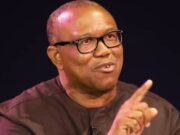The World Bank has identified debt and inflation as two big problems facing global growth, just as Nigeria grapples with mounting debt issues and skyrocketing 15.92 per cent inflation.
The Bank disclosed that high debt and deficit levels have put countries under severe financial stress, noting that 60 per cent of low-income countries are already either in debt distress or at high risk of it.
World Bank Group President, David Malpass who stated this at the Spring Meetings 2022 Media Roundtable opening remarks reiterated that “We expect the debt crisis to continue to worsen in 2022”.
Malpass said, “I want to say a few words on debt and inflation. These are two big problems facing global growth. Due to high debt and deficit levels, countries are under severe financial stress. Sixty per cent of low-income countries are already in debt distress or at high risk of it.”
He recommended his suggestion at the April 13, virtual conference on debt transparency and sustainability, as steps to improve the implementation of the Common Framework.
These included: “Establishing a timeline for forming creditors’ committees. Suspension of debt service payments and penalty interest. Expanding eligibility. A simple rule so that it can be evaluated and enforced. Engaging commercial creditors at the beginning of the process.”
On inflation, which is causing immense strain, the World Bank President advised that policies need to be adjusted to enhance supply, not just increase demand.
“I want to turn now to the inflation problem, which is causing immense strain. Policies need to be adjusted to enhance supply, not just increase demand.
“Markets are forward-looking so it’s vital for governments and private sectors to state that supply will increase and that their policies will foster currency stability to bring down inflation and increase growth rates. This is especially important as global supply chains shift away from dependency.”
The World Bank President called on Central Banks to use more tools under current policies, stressing that the inequality gap has widened materially, with wealth and income concentrating in narrow segments of the global population.
Malpass warned that “Interest rate hikes, if that’s the primary tool, will add to the inequality challenge that the world is facing, and added, “Central banks can use more of their tools, not just interest rates. Capital is being misallocated now.”
According to the World Bank President, “one of the focal points should be using all the central bank tools so that capital is allocated in a way that helps increase supply. That will be an effective way to address inflation.
“Some of the tools include: Changing the duration of their portfolio; it would be very helpful to shorten it. Encouraging supply through their regulatory policies. Providing forward guidance that fosters currency stability. Other tools as well to powerfully address the inflation problem.”
In addition to the high priority that is needed for energy and food production, he said “we must have a global effort to strengthen security and stability. This involves a commitment to security and peace. It involves constant efforts to strengthen institutions to improve their coordination, and to raise living standards.”
He decried the issue of fragility as a major risk within the developing world and pledged to discuss all the topics with shareholders and member countries in the spring meetings.
Credit: tribuneonlineng.com











































































